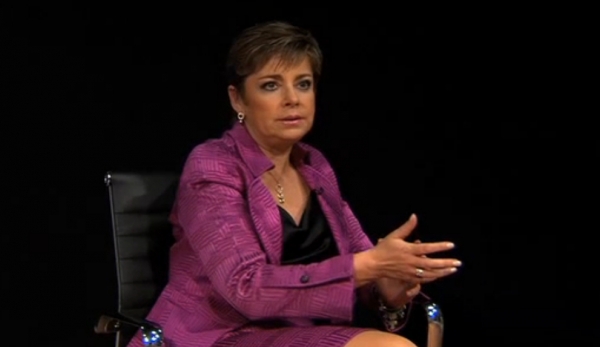Welcome to Around the World! This week we feature discussions on crowdsourcing diplomacy, educating tomorrow's global leaders today, and more!
 | Crowdfunding Diplomacy: The Next Frontier for Government If you combined government’s ability to convene and accelerate projects globally with the crowdfunding platform’s ability to engage local communities and investors in projects, you would have a potentially game-changing impact on grassroots diplomacy and development. Read more about it here. |
 | Tomorrow’s Global Workers Need Global Education Today Those who are best prepared for the new realities of the job market are the ones most likely to first be hired, and then to succeed. We need global education to develop global workers who will make a positive difference in the world. Read more about it here. |
 | The Global War for Talent in Latin America: An Interview with Monica Flores Barragán Across the globe, we hear too many stories of high youth unemployment. Monica Flores, Regional Managing Director for ManpowerGroup’s Latin America division, is on the front lines of bringing talent to available jobs, as she oversees a continent-wide recruitment and training effort. Read more about it here. |
 | Curbing the Flight of Human Capital The last time Spain saw a flight of human capital at today's levels, it was more than 60 years ago during the Spanish Civil War. Read more about it here. |
 | #2050Jobs: The Future of Human Capital The world is facing an employment crisis. Almost 200 million people around the world are unemployed, yet companies can't find workers to fill open positions. Diplomatic Courier and STEMconnector presented a high-level discussion, "Talent Mobility and the Future of Jobs", as we look to the year 2050. Read more about it here. |
Around the Web
Police violence against demonstrators in Tuzla last week spawned a protest on Friday in Sarajevo, as anger at government corruption and high unemployment rates spread across Bosnia & Herzegovina. The New York Times reports: "Social media—primarily Facebook and Twitter—have recently harnessed long-simmering frustration and anger at state corruption, leading to demonstrations where the gulf between the protesters and the political elite was palpable, and somewhat reminiscent of the recent, far bigger antigovernment protests in Ukraine." British Foreign Secretary William Hague called the protests, like the ones in Kiev, a "wake up call."
This Week in History
1964: The 'British Invasion' began, as the Beatles arrived in the U.S. for the first time. Sunday marked the 50th anniversary of the Beatles' performance on "The Ed Sullivan Show," a performance that Nielsen reported had 45 percent of all TVs in use at the time tuned in, and that sparked a seismic shift in American culture.


a global affairs media network
Around the World!

February 10, 2014
Welcome to Around the World! This week we feature discussions on crowdsourcing diplomacy, educating tomorrow's global leaders today, and more!
 | Crowdfunding Diplomacy: The Next Frontier for Government If you combined government’s ability to convene and accelerate projects globally with the crowdfunding platform’s ability to engage local communities and investors in projects, you would have a potentially game-changing impact on grassroots diplomacy and development. Read more about it here. |
 | Tomorrow’s Global Workers Need Global Education Today Those who are best prepared for the new realities of the job market are the ones most likely to first be hired, and then to succeed. We need global education to develop global workers who will make a positive difference in the world. Read more about it here. |
 | The Global War for Talent in Latin America: An Interview with Monica Flores Barragán Across the globe, we hear too many stories of high youth unemployment. Monica Flores, Regional Managing Director for ManpowerGroup’s Latin America division, is on the front lines of bringing talent to available jobs, as she oversees a continent-wide recruitment and training effort. Read more about it here. |
 | Curbing the Flight of Human Capital The last time Spain saw a flight of human capital at today's levels, it was more than 60 years ago during the Spanish Civil War. Read more about it here. |
 | #2050Jobs: The Future of Human Capital The world is facing an employment crisis. Almost 200 million people around the world are unemployed, yet companies can't find workers to fill open positions. Diplomatic Courier and STEMconnector presented a high-level discussion, "Talent Mobility and the Future of Jobs", as we look to the year 2050. Read more about it here. |
Around the Web
Police violence against demonstrators in Tuzla last week spawned a protest on Friday in Sarajevo, as anger at government corruption and high unemployment rates spread across Bosnia & Herzegovina. The New York Times reports: "Social media—primarily Facebook and Twitter—have recently harnessed long-simmering frustration and anger at state corruption, leading to demonstrations where the gulf between the protesters and the political elite was palpable, and somewhat reminiscent of the recent, far bigger antigovernment protests in Ukraine." British Foreign Secretary William Hague called the protests, like the ones in Kiev, a "wake up call."
This Week in History
1964: The 'British Invasion' began, as the Beatles arrived in the U.S. for the first time. Sunday marked the 50th anniversary of the Beatles' performance on "The Ed Sullivan Show," a performance that Nielsen reported had 45 percent of all TVs in use at the time tuned in, and that sparked a seismic shift in American culture.


